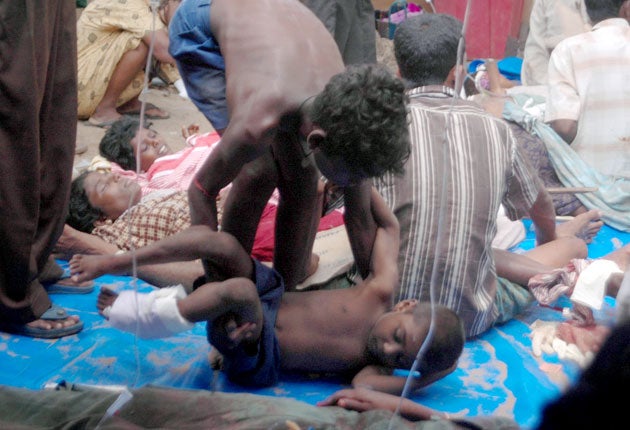Last push to drive out Tamil rebels
Fears of a 'bloodbath on the beach' as Sri Lankan troops advance further into Tiger territory

Sri Lankan troops battled further into the last strip of rebel-held territory yesterday, reportedly allowing more civilians to flee but also triggering mounting fears about a possible "bloodbath on the beach".
The rebel Liberation Tigers of Tamil Eelam (LTTE) said their veteran leader, Vellupillai Prabhakaran, was directing what appears to be a last stand as government troops pushed forward. According to the rebels, 1,000 civilians had been killed – a government doctor among them – though the military disputed this.
The International Committee of the Red Cross (ICRC) said the situation was "nothing short of catastrophic".
A day after 35,000 civilians escaped the now tiny war zone in north-east Sri Lanka, the military said last night that figure had now reached 52,000. "Our troops are rescuing the trapped civilians. It's the LTTE that is preventing civilians from fleeing," the military spokesman Udaya Nanayakkara said. While most escaped on foot, thousands of civilians took to the sea, boarding small boats to escape the coastal strip. Naval boats patrolled the waters, helping to pull the civilians aboard before taking them to makeshift processing centres.
Aid groups say that up to 100,000 civilians remain inside the war zone and are in increasing danger as the government troops push forward.
"The fear is of a bloodbath on the beach," said Sarah Crowe, a regional spokeswoman for Unicef.
"The LTTE needs to let the civilians go and the government must show maximum restraint."
With journalists and almost all aid workers prevented from reaching the war zone, she said there was a danger that the conflict might become a war without witnesses. "It's a catastrophe for the children."
But the Sri Lankan government shows no inclination to stop what it believes is the final play in a bitter, 25-year civil war.
It has repeatedly said that to order a ceasefire now would only give the LTTE an opportunity to strengthen its defences and force more civilians into military roles. On Monday, President Mahinda Rajapaksa made this point to Gordon Brown when the two spoke by telephone.
Thousands of civilians are living directly on the beach in bunkers dug in the sand. They shelter from the elements under tarpaulins. There are shortages of food and medicine, many suffer from diarrhoea, and sanitation facilities are all but non-existent.
With people in the war zone packed so densely together, and with the LTTE fighters believed to be mingling with the civilians, aid groups warn of a likely "dramatic rise" in deaths as the military operation continues.
"The situation is nothing short of catastrophic. Ongoing fighting has killed or wounded hundreds of civilians who have only minimal access to medical care," said Pierre Kraehenbuehl, the ICRC director of operations.
The UN estimates that more than 4,500 civilians have been killed and more than 10,000 wounded in the past three months. In an email to reporters yesterday, the LTTE said that about 1,000 civilians were killed and 2,300 wounded in Monday's military operation to breach an earthen wall and allow people to escape. Aid groups say there is widespread evidence the LTTE has been preventing civilians from leaving and has even shot and killed those trying to escape.
Many analysts say that if Sri Lanka is to end the threat from rebels it must work not only to find a political solution for the Tamils but a peaceful conclusion to this military operation.
"At this decisive moment, it is the Sri Lankan government that holds the lives of the trapped Tamil civilians in its hands. It is to the Sri Lankan government that international leaders must send their most immediate messages of restraint," said Robert Temple, of the International Crisis Group.
"How the war ends will be critical to Sri Lanka's future. Will it be in a bloody massacre whose memory will be used to incite decades more war and terrorism? Or will we see renewed efforts to... build a new, more peaceful Sri Lanka for all its people?"
Subscribe to Independent Premium to bookmark this article
Want to bookmark your favourite articles and stories to read or reference later? Start your Independent Premium subscription today.

Join our commenting forum
Join thought-provoking conversations, follow other Independent readers and see their replies